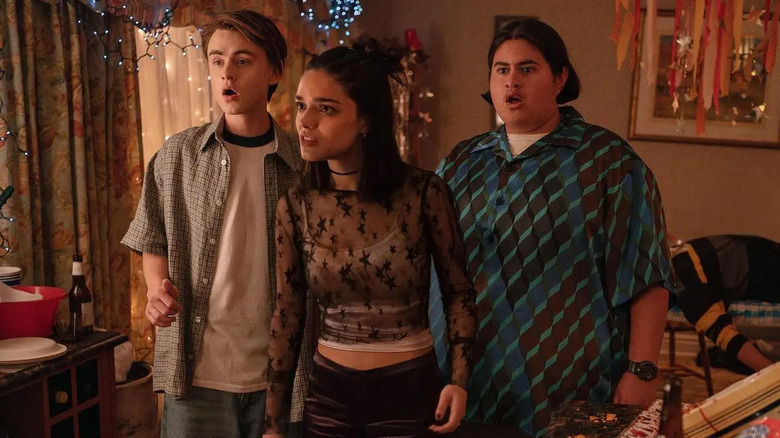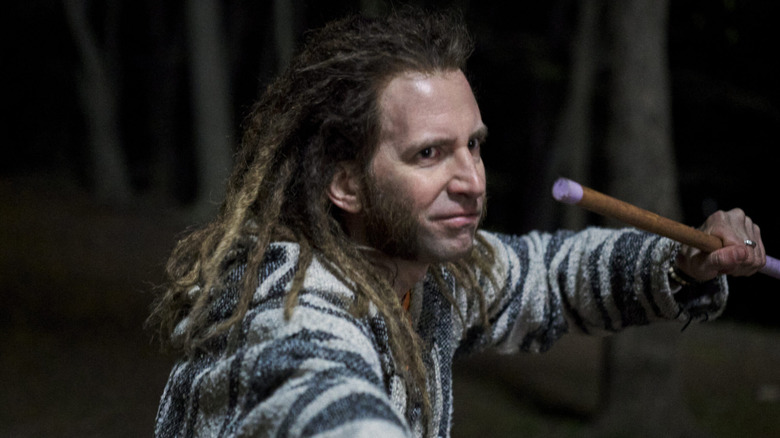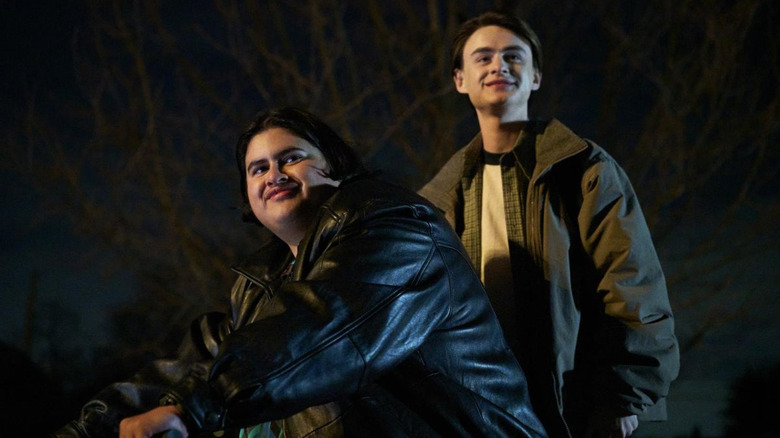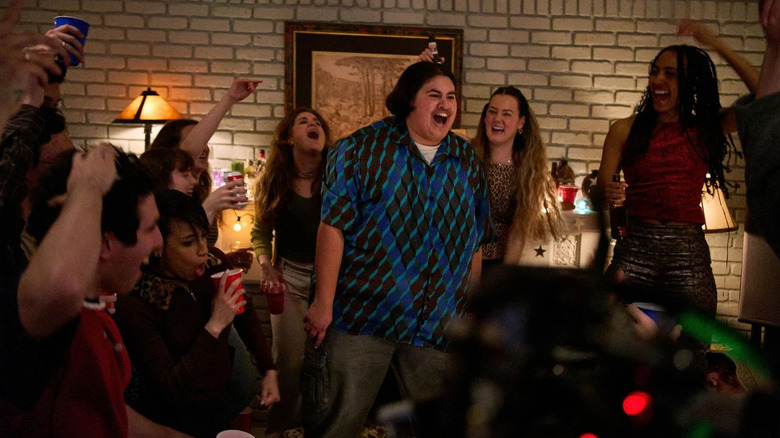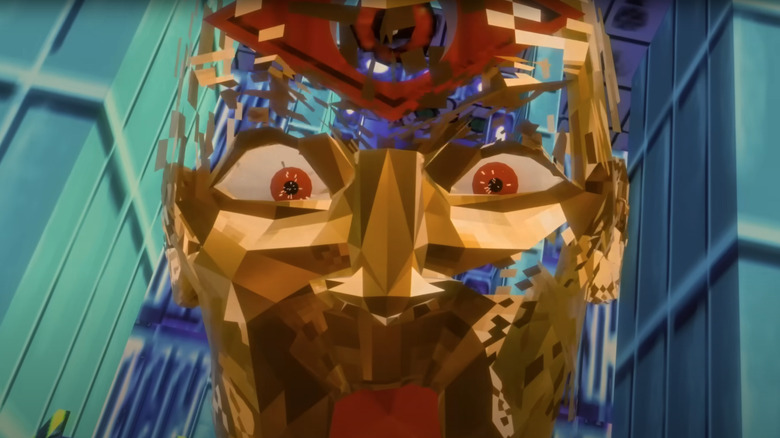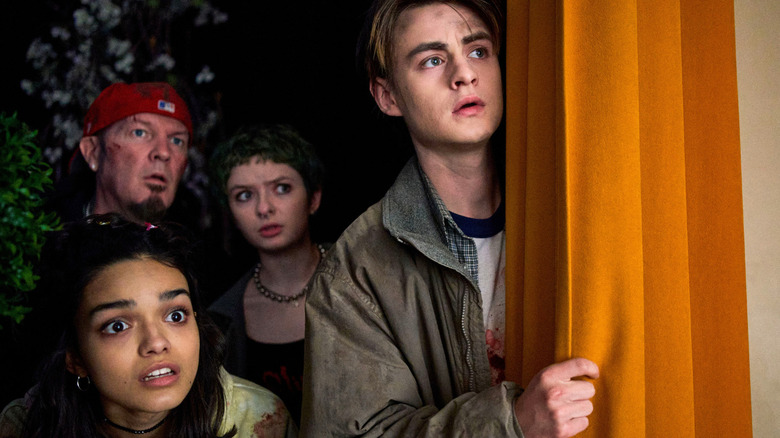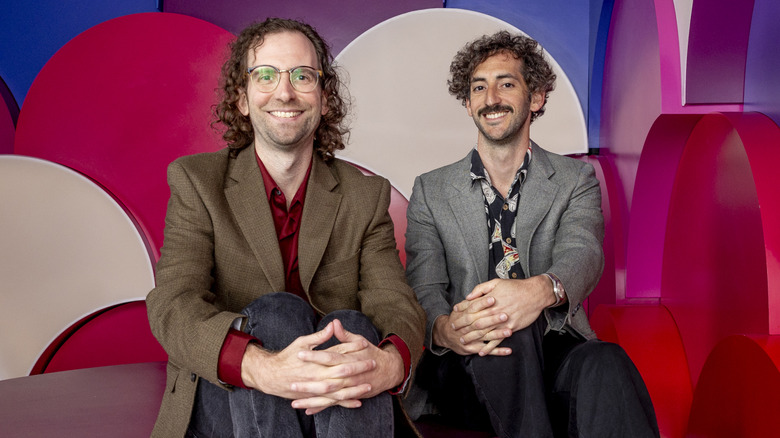Y2K Director Kyle Mooney, Co-Writer Evan Winter And Stars Jaeden Martell & Julian Dennison Go Back To 1999 [Exclusive Interview]
Kyle Mooney's feature directorial debut "Y2K" went to theaters after the horror comedy made its debut at the South by Southwest film festival earlier in 2024 (read our review). Taking cues from high school party movies like "Can't Hardly Wait" and mixing them with late '90s horror movies like "The Faculty" and dated technological thrillers like "Lawnmower Man," the film finds a group of teens facing an apocalyptic scenario in which technological devices like clunky computers, VCRs, Discmans, and Tamagotchis suddenly form into deadly creatures hellbent on taking over society. Basically, it's the worst case scenario that imagines what the world might have been like if Y2K turned out to be a legitimate threat.
At the center of the movie are best friends Eli (Jaeden Martell of "IT") and Danny (Julian Dennison of "Deadpool 2"). While both are a bit socially awkward and into their own geeky tendencies, like custom action figures of the cast of "That '70s Show," Danny is starting to blossom as a cool kid while Eli is still struggling to get the courage to ask out Laura (Rachel Zegler), the quintessential "girl of his dreams" that so many high school movie protagonists have desired before. Trying to navigate those teen struggles amidst a deadly apocalypse adds a whole new wrinkle, and there are plenty of dark laughs to be had among the threat of this computer hive-mind attack.
Leading up to the release of "Y2K," I got the opportunity to speak with Jaeden Martell and Julian Dennison about immersing themselves in the culture of 1999, which they didn't experience themselves, having not been born until a few years later. Plus, I spoke with director Kyle Mooney and co-writer/producer Evan Winter about their cinematic influences and coming up with the initial idea. Plus, I asked them all about working with a certain surprise actor who hilariously plays himself in the back half of the movie. However, these interviews require venturing into spoiler territory, so if you haven't seen "Y2K," you might want to remedy that before reading.
Note: The following interviews have been condensed and edited for clarity and length.
Y2K has a killer premise that somehow has never been exploited on screen in a major movie
Where did this idea come from, and how had it not been done before?
Kyle Mooney: I think, for those of us who were around during Y2K, it was just such a major letdown. I've always been minorly obsessed with it, and I think I held onto that for years, and one day — it was January 1, 2019, New Year's Day — I had the small seed of an idea of there should be a movie about teenagers going to a party and Y2K actually happens. I texted Evan and we started pitching on it, coming up with ideas, and within a week, we pretty much had the building blocks for what this movie would be. And I think we were both ... Evan was in eighth grade in the '99/2000 year. I was a freshman. I think there was something very exciting to us about putting that era on screen because you don't get to see it a ton, and that was our whole teenage life, pretty much.
Yeah. I think only just now are they starting to dig back into late nineties, 2000s as nostalgia for big screen fodder.
Mooney: Which is funny, because I feel like historically when people make movies or call back to a previous era, it's usually 10 to 15 years later. Now it's almost 25, so it feels like for whatever reason, there's a longer gap for this period.
Evan Winter: Worth the wait. We'll take it.
I'm surprised too, because conceptually, it feels like such a no-brainer idea that I am surprised that no one did this, like, "Oh, well, what if Y2K did happen like this?" It's such a good idea.
Mooney: We've been saying the same thing for years. We can't believe that no one had this idea before us.
Winter: Yeah, there is some TV movie that was made in '99, which we watched the trailer for. I never watched all the way through, and I feel like maybe there are some planes that crash in it or something like that, but yeah, agree. So fortunate that we are the first people to do it.
Jaeden Martell and Julian Dennison weren't born when Y2K happened
You guys were both born after Y2K, so what was your frame of reference for Y2K before this movie? Is that something that they teach as part of modern history in school?
Jaeden Martell: Modern history. That's funny. I didn't think so. Maybe it was just tapping into the culture, just listening to some music, watching some flicks, what they were into. Then it opened up a lot of conversations doing this movie, talking to people about their actual experience leading up to Y2K and the fear that they had. Which I feel like most people were just kind of brushing under the rug before. Doing this film, I feel like when they talked about, it's like, "Oh yeah, just maybe a thing was going to happen." But now that the conversation is open, people were like, "Oh yeah, I got ready. I knew someone with a bunker. I was under a table." Crazy things.
Julian Dennison: Yeah, I think talking to older siblings and older cousins who were teens when it was happening, and yeah, just them telling me funny stories about what they were doing and where they were at, or if they were at a party and stuff like that. So I think it was, kind of like Jaeden, like watching films and listening to music all the time. Also, just having — we had really long great conversations with Kyle and Evan, and just asked a lot of questions about what we were doing, and why we were doing stuff, and why we were saying certain things, and stuff like that.
What was some of your favorite movies and music that you discovered in getting in the vibe for 1999?
Martell: I've always been a big '90s hip-hop fan. So A Tribe Called Quest, Digable Planets, The Pharcyde, and stuff like that. But I kind of had to stay away from that, as that wasn't in my character's forte, but I've always been obsessed with that. Not a huge fan of the other stuff though, the poppy '90s and early 2000s stuff. Not to talk s***, but crap.
Dennison: I grew up with mom and dad and older siblings always [playing] '90s R&B, and I don't know, a lot of Destiny's Child and a lot of stuff like that. So I feel like Danny is also an undercover, really loves '90s R&B, but never got the chance to kind of play it because he hung out with Eli, and he wasn't into that. So I think something like the Sisqo "Thong Song" is so Danny, and he's like, "This is my chance. This is the only moment I'm ever going to be able to use this to my advantage."
Julian Dennison listened to the Thong Song for hours
In "Y2K," when the characters portrayed by Jaeden Martell and Julian Dennison attend a big high school New Year's Eve party, Julian's character gets a moment to shine when he starts singing and dancing to the hit R&B track "Thong Song" by Sisqo. Of course, I had to ask Dennison whether this was something he was acquainted with before this movie came along.
Now had you heard "Thong Song" before that came out? Did that make its way down in your neck of the woods?
Dennison: Yeah, yeah. No, no, for sure. Sisqo was still huge in New Zealand, okay. We get everything 30 years after. [laughs] No, yeah, of course. The "Thong Song." I remember, I vividly remember my mom turning that off on the radio. She's like, "We're not listening to a song about women's underpants." So yeah, it was fun. It was just funny listening to and being like, "Man, this is a part of my job." My girlfriend would FaceTime me, and she'd be like, "What did you do today?" I'm like, "Oh, I had the day off and I listened to the 'Thong Song' for three and a half hours."
How long did it take you to get the dance moves down?
Dennison: To be honest, not long at all. I'm going to blow my own whistle on that one. I did a two-hour dance class a week before shooting, and they're like, "Just remember this, and you'll be fine." It's really funny — I said that and I was stressed out — but the scene we shot at the end, where he's like a ghost, I guess, he's in heaven, we shot that months after [I was done with principal photography], and it was on the other side of the world. I remember I was in Ireland at the time shooting something else, and I had to get [online] and dance. This is one o'clock in the morning, and I'm dancing in my apartment, and I'm dancing with this choreographer on Zoom to the Sisqo "Thong Song," and I'm shooting this other project. The person who lived under me was a cast member as well, and they texted me, and they're like, "Hey, are you okay? I'm trying to get sleep. We have an early start in the morning." I was like, "I'm so sorry, I have to shoot this thing for this film I'm doing." But I had to do the dance moves, and it was quite funny.
These '90s movies influenced the style of Y2K
Mooney: Obviously the movie has a pretty big turn, so that early period where it is pre-midnight, and it is like a teen house party movie, there's a real wealth of those films, that genre in the late '90s, like "She's All That," "Can't Hardly Wait," "10 Things I Hate About You." We wanted to try to filter that era of fun teen studio house party comedies through also maybe a slightly more realistic [lens], remembering what it felt like when we lived through that time. But just the structure of it was something that those movies were definitely a big influence on us. Then after the turn, yeah, I love "The Faculty," and we talked about "The Faculty" quite a bit. "Hackers" was another one that we talked about. Yeah, what else? Also, just from pulling references, it would be like "Lawnmower Man," "Virtuosity."
It doesn't get a ton of representation in terms of the story arc of our film, but one piece of media that I'm very into are these Mind's Eye videos. I don't know if you're aware of those, but it's early computer graphics, but that was more of just like an aesthetic influence.
Winter: Visual reference, yeah. And I guess, I don't know, there's a lot for us too in terms of just aesthetics and research. Kyle is a big YouTube rabbit hole guy, and just in terms of when we were figuring out costumes and hair and makeup and just the overall look, Kyle did a lot of research looking at teenagers messing around on video cameras, like video yearbooks or just walking through the halls in the late '90s. That stuff is all on YouTube, and I feel like we were hoping that that energy comes through in various ways.
Mooney: I was just remembering today, I don't know if you remember me showing you, there was this TV show in '99 about seniors in high school called "American High" that was on PBS that is really a really good time capsule of the era, and there's a character in it, whose name I can't remember right now, who almost could be a member of our, quote unquote, rap rock crew. I think he's wearing a Korn shirt and he's just a full-on troublemaker.
Winter: Yeah, that was a really cool thing to see, because I'd never seen it before we were prepping this.
Mooney: One thing that I think we just always try to be conscious of — and Evan's touched upon this before, so I don't want to steal your thunder by any means — but there's media out there that can really exploit nostalgia and hit you so hard with the references. Sometimes it's just a list of references and there's nothing more beyond that, so I think that was something that we carried with us was more just a constant gut check of does this feel right? Are we hitting something too hard? Are we serving the story and the characters correctly here? I don't know if we thought anything was out of bounds, but I think we were definitely constantly thinking of like, "Let's be as smart and thoughtful about this as we can."
Working with Fred Durst and flashing back to the height of his fame
In the back half of the movie, while techno-monsters are wreaking havoc across town, Eli, Laura, and Ash decide to make a stop at their local video store to grab something that might be helpful to them. When they enter the video store, they run into a mysterious figure who turns out to be famed late '90s/early 2000s rap-rock star Fred Durst, frontman of the group Limp Bizkit, who just so happened to be putting on a New Year's Eve concert nearby.
Durst's role is a bit more than a cameo, as he becomes a pivotal part of the film's third act, joining the roaming group of teens trying to survive this techno attack on the world. Needless to say, I had to ask everyone about working with Durst on the movie.
What was it like working with Fred Durst, and was it always Fred Durst from the get-go? Because his inclusion, and I didn't even think about this until you guys touched upon it a little bit during the Q&A at the Chicago screening, but he really is representative of that era of music and pop culture in a way that almost nobody else is. It's a very specific window of time in pop culture. So did you guys have a backup plan if he wasn't interested, if it didn't work out?
Mooney: We definitely pitched ideas and he was there from moment one. From I think the first week of us talking about the movie, we were like, "Oh, it'd be really fun to get Fred Durst in there fighting along with our heroes." There were definitely pitches. I don't even know if I want to name those names, but any name we would say, it's either they weren't as recognizable in some way or another, or maybe they are not on the best side of culture these days.
Winter: Not a good person today.
Mooney: Yeah, Fred just checked all the boxes, and like you said, he's just so emblematic and so iconic, and he's got the hat. He's got everything going for him, so there was a lot riding on that, and he's the first person we went out to when we found out the movie was going, and if he hadn't taken the job, I don't know what we would've done.
Winter: Yeah, we were really lucky that he just got it and was into it and wanted to poke fun at himself. He pushed it further in some places, but then also just understood that it's like he's playing this public persona of himself from that era, but then in this excised superhero way and almost action star. So it was so cool that he was into it and jumped on board with us.
Mooney: And just a very good actor.
Winter: Amazing actor, yeah.
Was Limp Bizkit a group that you guys were familiar with? Were you guys fans beforehand? And what was it like working with him on set?
Martell: Definitely familiar. I didn't know what to expect from him as a person, considering his persona, his look, his music. But he was such a kind and wise presence and kind of blew me away. There's certain things, because you expect a lot from an actor you look up to, or anybody you look up to, and you kind of expect something from them. They could disappoint you. But I didn't know what to expect from Fred, and he was so kind, and so cool, and gentle, and inquisitive, and open about his process of being an artist, and being this kind of icon and the pressure of that and all that. He was wonderful.
Julian Dennison didn't get to spend the same amount of time with him, as his characters dies earlier in the movie before Fred Durst enters the story.
Dennison: Yeah, it was different for me, actually. We kind of shot the film chronologically.
Okay. So you didn't really get any time with him?
Dennison: Yeah, didn't really get to spend any time with him. But meeting him at South by Southwest and after we shot, yeah, I don't know, it's just when you meet someone who's lived a lot of life and has a lot of wisdom, all you can really do is be a sponge and soak them in. I think that was a highlight of being able to even just be in the same room as him. It's like he defines a generation or a thing of time, like a certain time. I think it's pretty crazy that we get to do what we get to do.
Lessons from Saturday Night Live
Kyle, I'm a big fan of your work with Good Neighbor and "Saturday Night Live," and I was curious, what lessons did you learn at "SNL" that maybe have helped you both as a performer and a filmmaker since you left the show?
Mooney: I think that any professional experience or any filmmaking experience is always going to teach you something, and you're going to grab what works for you and what doesn't, and so you're constantly collecting these ways of working and interacting with people on set. So that's everything I've ever done, but I think specifically "SNL," well, one, you have celebrities, full-on stars, coming in every single week, so you have to learn how to interact and to talk and to potentially give a note or get on the same level of them in terms of dictating what is funny about something.
Then, what that show also does and presented for me as a writer is, all of a sudden, you're learning what plays or what doesn't play for a broader audience. So I definitely took that into the process of writing with Evan about, "Okay, this feels like something that could maybe get a laugh. Maybe we're going a little too niche here." Also, I am just less precious about my work, because we would be, on Saturday, cutting stuff day-of, getting rid of chunks of dialogue. So I don't care if we have to get rid of a page, and I always know there's always an alt or there's always a way to punch it up.
Winter: Yeah, it was very cool just from my side seeing the way that Kyle works, because it is so much easier to not be precious about something or to just roll with it and be like, "Well, maybe this could be better, or maybe this isn't clicking," even though it really means something to me. To see my partner in this just being like, "Yeah, I have faith that we can always find something better. If people aren't responding to this or I have a feeling about it or he has a feeling about it that isn't quite working, then let's just lose it." It's a really good lesson for making stuff.
